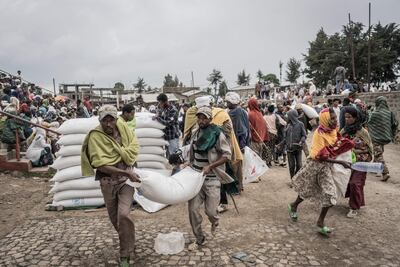Tigrayan rebel forces are still in Afar, the Ethiopian government has said.
It came after a rebels said they were leaving the area. Legesse Tulu, a government spokesman, told state media reports of a rebel pullout were “big lies".
Afar police said Tigrayan forces are in Koneba, Abala, Berhale and Magale with no changes since Monday, Reuters reported.
Earlier, the Tigray People's Liberation Front had said the Tigrayan forces were withdrawing so humanitarian convoys could enter the famine-hit area.
Little aid has come into Tigray, where more than 90 per cent of the population is short of food.
The UN has blamed government bureaucracy and fighting for blocking convoys.

“We have already withdrawn from all parts of Afar,” a rebel spokesman, Kindeya Gebrehiwot, told AFP. “Humanitarian and political issues should be delinked.”
On March 25 the federal government announced a unilateral ceasefire, saying it would allow humanitarian aid to enter.
Tigrayan forces agreed to respect the ceasefire on the condition that sufficient aid was delivered to their region “within reasonable time".
The war in northern Ethiopia broke out in November 2020, when Prime Minister Abiy Ahmed, a Nobel peace prize winner, sent troops into Tigray in response to what he said were rebel attacks on army camps.
An early victory against the TPLF, which ruled Ethiopia for nearly 30 years until 2018, was followed by a comeback by the rebels last June, when they recovered control of Tigray and expanded into neighbouring regions.
Meanwhile, Tigrayan peacekeepers, who are not returning home and instead seeking asylum in Sudan over safety fears, are victims of rebel “propaganda”, the Ethiopian defence ministry said.
More than 500 UN peacekeepers deployed to the disputed border region of Abyei between Sudan and South Sudan, have asked for asylum, a UN peacekeeping representative told AFP.
Until last year when there was a break in relations between Sudan and Ethiopia, Ethiopian forces accounted for the majority of the 4,000-member United Nations Interim Security Force for Abyei.
“A number of peacekeepers have chosen not to return and are seeking international protection. They are being protected by the UN in a secure location,” the UN representative said.
Ethiopia's defence ministry accused the TPLF rebels of “sowing the lie” that peacekeepers would be jailed if they return to Ethiopia.
A statement by the ministry also said some peacekeepers had refused to return in fear of the rebels “and not because of hatred of their country".
The 528 peacekeepers still in Abyei said they wanted to “be a voice against the siege which is killing our people".
“We don't want to continue working for a regime that is massacring and slaughtering our people,” the statement said.

